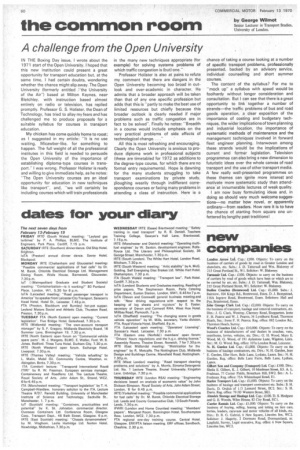A challenge from the Open University
Page 62

If you've noticed an error in this article please click here to report it so we can fix it.
IN THE Boxing Day issue, I wrote about the 1971 start of the Open University. I hoped that this new institution could present a great opportunity for transport education but, at the same time, I had certain doubts, wondering whether the chance might slip away. The Open University (formerly entitled !."the University of the Air" i based at Milton Keynes, near Bletchley, with instruction based almost entirely on radio or television, has replied promptly. Professor G. S. Holister. the Dean of Technology, has tried to allay my fears and has challenged me to produce proposals for a suitable syllabus for courses in transport education.
My chicken has come quickly home to roost: as I suggested in my article: "It is no use waiting, Micawber-like, for something to happen. The full weight of all the professional institutes in this field is needed to persuade the Open .University of the importance of establishing diploma-type courses in transport.I was wrong. Professor Holister is ready and willing to give immediate help, as he notes: "The Open University courses are an ideal opportunity for education in new techniques like transport", and, "we will certainly be including courses which will train professionals
in the many new techniques appropriate (for example) for solving systems problems of which traffic congestion is (but) one."
Professor Holister is also at pains to refute my comment that there are dangers in the Open University becoming too broad in outlook and over-academic in character. He admits that a broader approach will be taken than that of any one specific profession but adds that this is -partly to make the best use of limited resources but chiefly because this broader outlook is clearly needed if major problems such as traffic congestion are in fact to be solved". Finally he notes: "Breadth in a course would include emphasis on the very practical problems of side effects of technological change...."
All this is most refreshing and encouraging. Clearly the Open University is anxious to produce diploma work in professional subjects (these are timetabled for 1972 as additions to the degree-type course, for which there are no formal entry requirements). Hope is dawning for the many students struggling to take transport examinations by private study, liloughing wearily through indifferent correspondence courses or facing many problems in attending a class of instruction. Here is a chance of taking a course looking at a number of specific transport problems, professionally presented, backed by an advisory service, individual counselling and short summer courses.'
The content of the syllabus? For me to "mock up" a syllabus with speed would be foolhardy without longer consideration and consultation. But I can see that there is a great opportunity to link together a number of strands-the traffic problems of bus and road goods operation, a clear exposition of the importance of costing and budgetary techniques, the wider implications of town planning and industrial location, the importance of systematic methods of maintenance and the management techniques involved in forward fleet engineer planning. interwoven among these strands would be the implications of current and former legislation. Television programmes can also bring a new dimension to futuristic ideas over the whole canvas of road transport and the use of other transport media. A few really well-presented programmes on these themes can ignite more interest and motivate more systematic study than attendance 'at innumerable lectures of weak quality.
I am now busy formulating ideas and, in doing so should very much welcome suggestions-no matter hew novel. or apparently ordinary-from readers. How rare it is to have the chance of starting from square one unfettered by lengthy past traditions!




































































